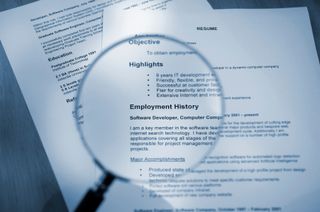 Do you ever wonder what goes through someone’s mind when they read your résumé? Are elements missing? Could your work history information be explained better? Employers are good at evaluating résumés because they’ve seen so many and have done it for a long time. To help you design a résumé that gets a second look, here are five standout tips.
Do you ever wonder what goes through someone’s mind when they read your résumé? Are elements missing? Could your work history information be explained better? Employers are good at evaluating résumés because they’ve seen so many and have done it for a long time. To help you design a résumé that gets a second look, here are five standout tips.
1. Include a brief summary. Who are you and why should an employer be interested? Highlight your skills and abilities at the beginning of your résumé. The key is to tell the employer why the company should hire you – or what you can bring to the team. Share information like years of experience you have and highlight two or three of your skills. Be specific and keep your résumé summary to about two sentences. Use this as a quick way to grab an employer’s attention and encourage further reading.
2. Don’t be overly wordy. Using more words on your résumé will not necessarily make you look more impressive to a potential employer. They don’t have a lot of time to devote to reading a lengthy document – instead they’re scanning for what stands out. Since you won’t have a lot of time to impress them, be sure to catch their attention quickly. Be clear, concise, and get to the point.
3. Be honest. In other words, don’t say you have five years of experience in something if you don’t. It’s always in your best interest to be truthful because an employer will find out. Employers are being more and more cautious about hiring. They’re not only checking your references, but they’re also searching for information online. Make sure you’re honest and upfront.
4. Identify your results. Employers are more interested in your impact than your job duties, so include quantifiable information on your résumé to identify your accomplishments. Don’t just tell an employer what your responsibilities have been, but also identify how you’ve made a difference. For instance, if you’ve previously helped raise funds for something, tell how much money you received. If you created a system for streamlining your company’s printing process, tell how much time and money you saved the company. Also, if you’ve managed individuals, specify exactly how many.
5. Brag a little. If you’ve won an award or received a certificate for a job well done, make sure you share it on your résumé. Now is your chance to let others know why you’re amazing and the right person for the job. Create a short section at the end of your résumé and title it “Accomplishments.” Then, list out a few of your greatest achievements.
Creating a résumé isn’t a difficult process, but it does take a little strategizing and time. Block off some time on your calendar to focus on yours, and use these tips and others from our Résumé Boot Camp to ensure that yours isn’t missing something it needs.



